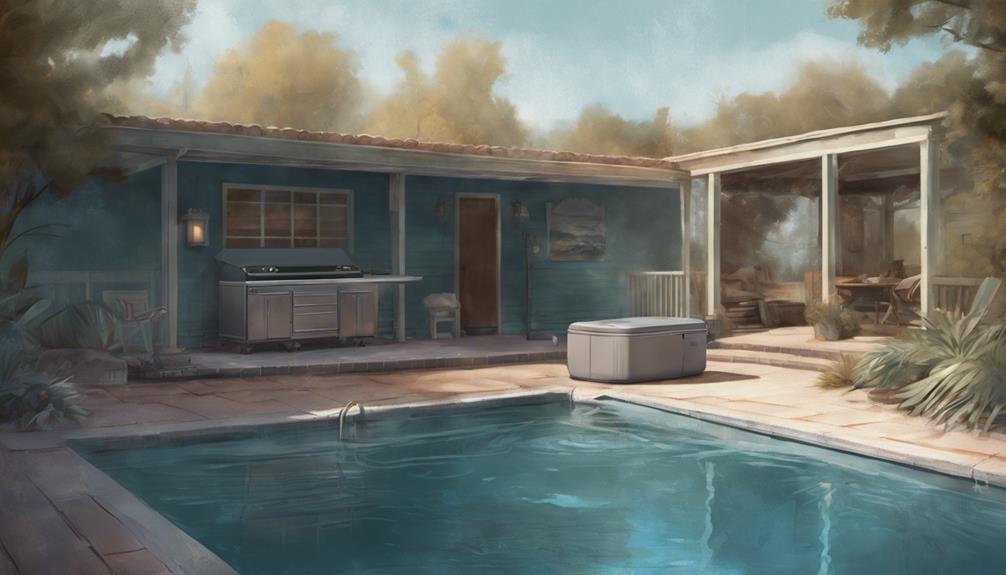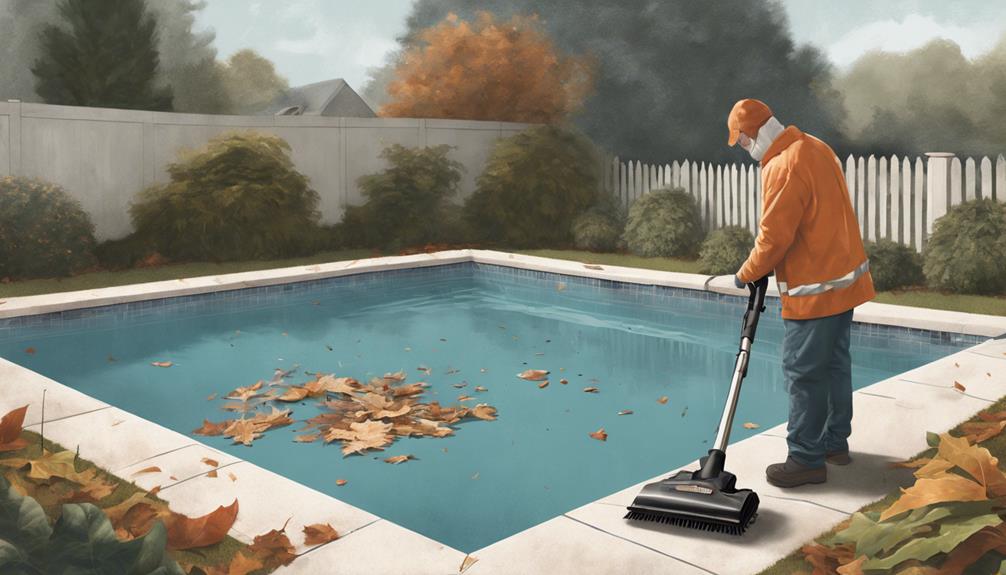In order to get your saltwater pool ready for a successful winter season, it is important to adjust your salt system by reducing chlorine output and storing the salt cell in a dry, warm location. Keep an eye on water chemistry levels by performing a thorough pool cleaning, ensuring pH levels are balanced, and maintaining proper calcium hardness levels. Safeguard pool equipment by draining water, cleaning baskets, and lubricating gaskets. Prepare the plumbing system for winter by removing water to prevent freezing and addressing any potential corrosion. Continuously care for your pool cover by using a durable cover, fastening it securely, and regularly inspecting and cleaning it. By following these steps, you can ensure that your pool is ready for the winter season.
Key Takeaways
- Lower chlorine output and store salt cell to prevent freezing.
- Monitor water chemistry levels for balance and prevent equipment damage.
- Protect pool equipment from winter elements for longevity.
- Winterize pool plumbing to prevent freezing and damage.
- Maintain pool cover care to shield pool from winter elements.
Adjusting Salt System for Winter
The adjustment of the salt system for winter is a vital step in preparing your saltwater pool for the colder months ahead. Lowering the chlorine output is important to prevent excessive production during the winter season.
Removing and storing the salt cell in a dry, warm location helps protect it and extends its lifespan. Proper adjustment of the salt chlorinator is necessary to prevent potential freezing and damage to the cell.
Monitoring Water Chemistry Levels
Adjusting the salt system for winter guarantees peak performance, and maintaining proper water chemistry levels is important in preserving the quality of your saltwater pool.
Thoroughly cleaning the pool to eliminate debris, skimming the surface, vacuuming the bottom, and brushing the walls are critical steps.
Balancing and cleaning the water to uphold correct pH levels, ensuring proper alkalinity, and calcium hardness levels are also essential. This maintenance prevents scale formation and equipment damage, extending the lifespan of your pool components.
Regular monitoring of water chemistry levels and making necessary adjustments will contribute to a healthy and well-maintained saltwater pool throughout the winter months.
Protecting Pool Equipment in Winter

How can you safeguard your pool equipment during the winter season to guarantee its durability and peak performance? Protecting pool equipment in winter is important to avoid costly repairs and ensure a smooth pool opening in the spring. One essential aspect is draining the pool water below certain levels and taking care of equipment like skimmers and pump baskets. Additionally, lubricating gaskets and shielding equipment from harsh winter elements are crucial steps to prevent damage. Here is a table summarizing key actions to safeguard your pool equipment:
| Protection Steps | Description | Significance |
|---|---|---|
| Drain Water Below Skimmer Level | Prevents freezing and damage to skimmer and equipment | Necessary for equipment longevity |
| Clean Skimmer and Pump Baskets | Removes debris and ensures proper equipment functionality | Maintains efficient pool operation |
| Lubricate Gaskets | Prevents cracking and maintains gasket flexibility | Extends the lifespan of equipment gaskets |
Winterizing Pool's Plumbing System
To effectively prepare a saltwater pool for the winter season, prioritizing the winterization of the pool's plumbing system is essential for preventing potential damage and ensuring a smooth reopening in the spring. Begin by removing water from the pipes to prevent freezing and take additional steps to prevent corrosion.
Follow specific procedures tailored for saltwater pool plumbing, ensuring proper drainage and protection against freezing conditions. This process helps prevent crystallization and potential damage to the plumbing system during the colder months.
Maintaining Ongoing Pool Cover Care

For the continued protection and preservation of your saltwater pool during the winter season, diligent maintenance of the pool cover is crucial in safeguarding the pool from potential damage caused by snow, debris, and UV rays.
Use a sturdy pool cover specifically designed for winter use to guarantee maximum protection. Secure the cover tightly using water bags, clips, or a cable system to prevent it from being dislodged by strong winds or heavy snow.
Regularly inspect and clean the pool cover to remove any debris or salt residue accumulation that could lead to damage. By maintaining ongoing care of your pool cover, you can extend its lifespan and effectively shield your saltwater pool from the harsh winter elements.
Frequently Asked Questions
Can I Use Antifreeze in My Saltwater Pool's Plumbing System for Winterization?
Using antifreeze in a saltwater pool's plumbing system for winterization is not recommended. Antifreeze can be harmful if it enters the pool water. Follow proper winterization procedures, such as draining water from pipes, to prevent freezing and damage.
Should I Completely Drain the Salt Cell Before Storing It for Winter?
Just as a gardener prunes plants for winter resilience, draining the salt cell before storage is akin to safeguarding its importance. Protect against freezing to prolong its lifespan and ensure best functioning come spring.
How Often Should I Check the Pool Equipment During Winter?
Regularly inspect pool equipment during winter to prevent damage. Check weekly for any signs of freezing, corrosion, or wear. Keep equipment clean, lubricated, and shielded from harsh elements. Proper maintenance guarantees longevity and efficient performance.
Is It Necessary to Remove the Pool Cover Periodically During Winter?
Like a watchful guardian, periodically removing the pool cover during winter guarantees proper ventilation and prevents moisture buildup. This practice helps maintain water quality, prevents damage to the pool structure, and secures a successful winterization process.
Can I Use a Regular Pool Cover for a Saltwater Pool During Winter?
Using a regular pool cover for a saltwater pool during winter is not recommended. Saltwater pools require specific covers designed to withstand the unique challenges posed by salt, such as corrosion and potential damage from salt residue accumulation.
What Are the Best Practices for Winterizing a Saltwater Pool?
When it comes to winter pool maintenance tips for a saltwater pool, there are a few best practices to keep in mind. First, make sure to clean and balance the water to prevent damage from freezing temperatures. Additionally, consider using a pool cover to keep debris out and maintain water temperature.
How can I prepare my saltwater pool for winter to ensure it is successful?
To prepare your saltwater vs chlorine pool for winter, start by adjusting the water chemistry and balancing the pH level. Lower the water level and clean the filter and pump. Lastly, cover the pool with a winter cover to protect it from debris and harsh weather, ensuring a successful winterization process.
What’s the Best Way to Prepare a Saltwater Pool for Winter?
Preparing a saltwater pool for winter requires careful maintenance. Start by adjusting the water’s pH and alkalinity levels. Then, clean the pool thoroughly and remove any debris. Finally, consider adding a winterizing chemical kit to keep the water balanced. This process is crucial for the longevity of saltwater vs chlorine pools during the colder months.
How Can Pool Design Help with Winterizing a Saltwater Pool?
Winterizing a saltwater pool can be made easier with the right pool design revolutionizes leisure. By incorporating features such as a pool cover, automated cleaning system, and proper drainage, a well-designed pool can minimize maintenance during the winter months and help protect the pool from potential damage caused by freezing temperatures.
What Winter Maintenance Tips Are Different for Saltwater Pools Compared to Chlorine Pools?
When it comes to winter maintenance, saltwater vs chlorine pool care can differ. Saltwater pools require special attention to their salt levels and may need to be shocked less frequently than chlorine pools. It’s important to follow manufacturer recommendations for winterizing either type of pool to ensure proper maintenance.
Conclusion
To wrap up, preparing your saltwater pool for winter is vital to guarantee its longevity and functionality. By adjusting the salt system, monitoring water chemistry, safeguarding pool equipment, winterizing the plumbing, and maintaining ongoing cover care, you can protect your pool against winter-related issues.
As the saying goes, 'An ounce of prevention is better than a pound of cure.' Prioritizing these maintenance steps will help you enjoy a trouble-free and well-maintained saltwater pool when warmer weather returns.










